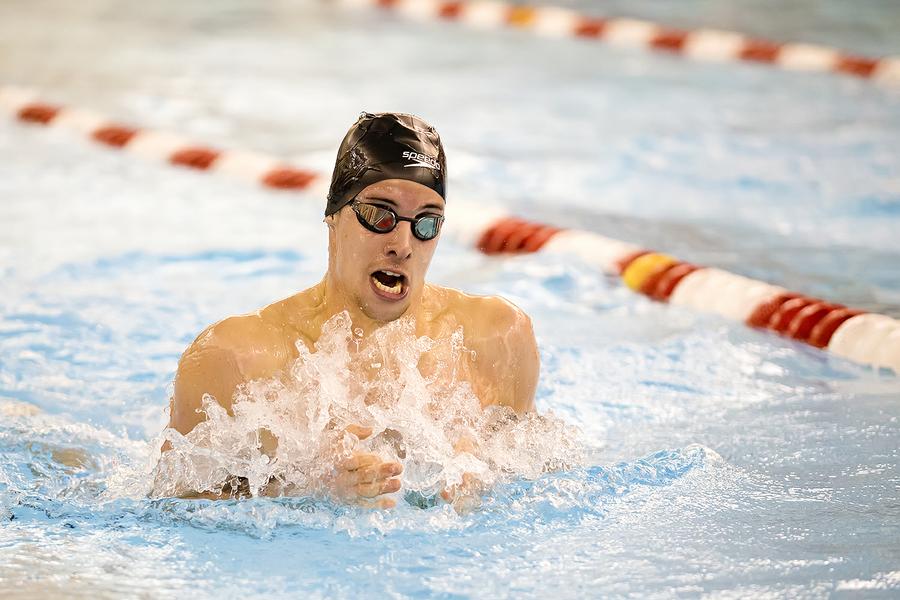
His last name has 16 letters and four syllables. He has the fastest returning 100-yard breaststroke time of anyone in American collegiate swimming. And, after two seasons at Western Kentucky University, junior Fabian Schwingenschlogl is joining the Missouri Tigers.
This summer, Western Kentucky’s swim team was suspended after allegations of hazing and sexual assault. And, after a 4,500 mile journey from Germany to Kentucky, Schwingenschlogl and junior Nadine Laemmler found themselves without a swim team only two seasons into their collegiate careers.
Both found a home at Mizzou.
“Western Kentucky really liked to party,” Laemmler said. “And here, it’s just more professional. It’s not that in the pool we give everything to be the best that we can, but even outside (the pool).”
WKU announced the five-year suspension of its swimming program April 14. This punishment came after a police investigation found that certain members of the team had committed acts of hazing, harassment and sexual assault during fall 2014.
Laemmler and Schwingenschlogl came to Missouri after coach Greg Rhodenbaugh confirmed they were not involved in the WKU scandal.
With the suspension of the program, WKU swimmers were free to transfer to any school that would take them, and they would not miss a year of NCAA eligibility.
>“Western Kentucky really liked to party,” Laemmler said. “And here, it’s just more professional. It’s not that in the pool we give everything to be the best that we can, but even outside (the pool).”
Schwingenschlogl and Laemmler are both from the Bavarian region of Germany and have been dating since before they enrolled at WKU. Since coming to Mizzou, they have been impressed by how their teammates handle themselves both in and out of the pool.
“Everyone knows what to do,” Schwingenschlogl said. “Everyone knows how to handle himself to be fit on Monday, fit during the week, go to bed early.”
For both swimmers, fitting in socially has not been an issue as the team has been welcoming since their arrival.
“It’s like she’s been on the team for years and it’s only been a couple of weeks,” Rhodenbaugh said. “Same with Fabian.”
Last season, Schwingenschlogl finished sixth at the Men’s NCAA Championship meet in the 100-yard breaststroke as a sophomore. All five finishers ahead of him were seniors. At the meet, he was also 12th in the 200-yard breaststroke and competed in the 200-yard individual medley. Laemmler was one of two WKU women swimmers to qualify for the Women’s NCAA Championship meet and specializes in backstroke.
For Schwingenschlogl and Laemmler, the 2015-16 season has great potential. They get to swim in the Southeastern Conference, one of the top conferences nationwide. It’s also an Olympic year.
“We both get the chance to make something special, make something happen,” Schwingenschlogl said.
This upcoming summer, Schwingenschlogl and Laemmler will try to make the German Olympic team. Schwingenschlogl said the Olympics are on his mind during practice and serve as motivation.
The 24-year-old Schwingenschlogl is set to essentially replace graduate Sam Tierney, a breaststroker and one of the top swimmers in Mizzou’s history. At the NCAA Championship meet, Tierney was only 12-hundredths of a second faster than Schwingenschlogl in the 100-yard breaststroke.
After losing one of the team’s top swimmers in Tierney, Rhodenbaugh suddenly found himself in a position to not skip a beat in the breaststroke.
“He kind of brings a level of breaststroke performance that we had last year,” Rhodenbaugh said. “(With) Sam, it took us four seasons to develop him into one of the best breaststrokers in the United States. Fabian is stepping right in, and Fabian has a chance to go further than Sam, only because he started ahead of Sam in college.”
As a graduate, Tierney is still swimming with the team to prepare for Olympic Trials next summer. Tierney and Schwingenschlogl train together and push each other in practice.
Rhodenbaugh feels that the addition of the Schwingenschlogl will be mutually beneficial.
“I think it’s going to be great on both accounts,” he said. “I think he’s going to add to our culture of hard work, and we’re going to add to his opportunity to train against some pretty elite athletes.”
Like Schwingenschlogl, Laemmler will train alongside top-level swimmers. Sophomore Hannah Stevens was recently named to the U.S. National Team in the 100-meter backstroke, and graduate Dominique Bouchard finished sixth in the 200-meter backstroke at the World Championships competing for Canada.
In the coming weeks, Mizzou swimmers will break into groups based on stroke and distance. As a backstroker, Laemmler will get to train with Stevens and Bouchard.
“I’m super excited to train with Hannah and Dom,” Laemmler said.
For Schwingenschlogl and Laemmler. the differences between Western Kentucky and Missouri have not gone unnoticed. Most notably, the campus and pool are significantly bigger at Mizzou. They have taken advantage of services that other schools don’t have such as academic advisors and a cafeteria at the athletic training complex.
The atmosphere of the team also stands out to Laemmler.
“The team’s just really close,” she said. “You come here and you don’t feel like an outsider. They just make you feel like you’re welcome and you’re part of their little family, and that’s really nice.”